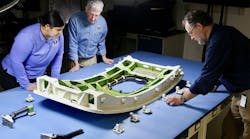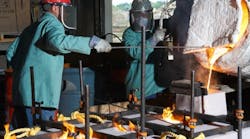Pacific Steel Casting Co. has reached an agreement with an environmental group whereby the foundry will invest in new pollution-control systems and establish cooperative methods to protect against new pollution risks. The agreement between the Berkeley, CA, foundry and Communities for a Better Environment must be confirmed by a federal court, which is hearing a lawsuit filed by CBE against the steel foundry in 2006.
PSC, which produces castings for trucks and buses, as well as water valves at three plants in Berkeley, still faces two other similar lawsuits.
CBE, a non-profit organization, alleges the foundry causes public health problems. It filed a federal suit against PSC last year under the Clean Air Act.
Joe Emmerichs, general manager and v.p.-Operations for PSC, stated: "Pacific Steel welcomes the cooperative spirit demonstrated by this agreement. We look forward to working closely with CBE toward our shared goals of reducing emissions for the benefit of our neighbors and workers."
According to PSC, there are three main points to the agreement:
— Pacific Steel Casting must implement a plan for selecting and inspecting the scrap metal melts. "Through notification of scrap suppliers and regular inspections, the goal is to reduce organic contaminants in the scrap supply that may release emissions during the steel making process," the foundry states.
— PSC must create a reserve fund of $350,000 for selected projects that achieve reductions in emissions levels at the facility. These projects must reduce particulate emissions, HAPs (hazardous air pollutants), or VOCs (volatile organic compounds), by at least two tons. These reductions must be in addition to emissions reductions being achieved by PSC's recent installation of carbon-filter adsorption system at its Plant 3.
— The agreement establishes the Joint Consultation Committee comprised of CBE, PSC, and the local labor union representing PSC workers, to meet quarterly to recommend expenditures from the reserve fund to reduce emissions.
The agreement allows CBE to inspect the scrap operations and emissions control systems at the foundry. It also allows inspections of Pacific Steel by CBE or its consultant, of the scrap metal operations or emissions mitigation projects that commence as a result of this agreement.
After three years, or once the fund is entirely spent, the agreement between the foundry and the organization will expire.
OSHA Cites Ohio Foundry for Safety, Health Violations
The federal Occupational Safety and Health Administration (OSHA) is proposing fines totaling $253,350 for St. Marys Foundry Inc., St. Marys, OH, for 31 alleged violations of workplace safety and health standards. The violations, including three that are characterized as willful violations and two as other-than-serious violations of OSHA standards, were discovered during safety and health inspections at the foundry on June 28, 2006. These inspections were the result of St. Marys Foundry being placed on OSHA's site-specific target inspection list because of high injury rates and Ohio's Primary Metals Industry Local Emphasis Program.
St. Marys Foundry has been inspected by OSHA four other times since 1994 and received 14 citations.
The "willful" violations OSHA cites concern St. Marys alleged failure to ensure employees wore respiratory protection, leaving them exposed to silica dust at up to 2,109% of OSHA-permissible exposure limits; failing to enforce the required hearing protection program; and allowing workers to use compressed-air pressure higher than what is allowed by regulation. The fines proposed for these charges total $168,000.
OSHA's "serious" citations were issued because workers at St. Marys were found to lack personal protective equipment; the operation lacks a medical-surveillance program; the plant was found to lack proper guardrails around casting pits, casting operations, and molds; and for other violations, all of which carry proposed fines totaling $84,350.
The two citations labeled "other-than-serious" citations concern St. Mary's failure to label confined spaces that require permits for access, and failure to record silicosis cases on the "OSHA 300" log (which records work related injuries and illnesses.) The penalties proposed for these total $1,000.
St. Marys Foundry was given 15 working days from the date of the citations to contest the citations and the proposed penalties.
EPA Intros New Review Process for U.S. Air Quality Standards
The U.S. Environmental Protection Agency has updated its process for reviewing and setting the national ambient air quality standards (NAAQS). The Clean Air Act requires that EPA review each standard on a five-year schedule.
A public workshop was held in June 2006 to receive comments on EPA's previous report on ways to improve the NAAQS process. And, EPA met with the Clean Air Scientific Advisory Committee (CASAC) for recommendations for revising the process.
EPA's next steps in the process include:
- Preparing a science and policy plan that outlines the schedule, process, and expectations for the next review;
- Developing a concise evaluation, integration, and synthesis of the policy-relevant science, including key science judgments used to conduct risk and exposure assessments;
- Linking the integrated science assessment and the risk/exposure assessment to ensure these are based on the clearest understanding of available scientific information.
The staff paper will be replaced with a more focused policy assessment to connect the EPA's scientific assessment and the judgments necessary to determine whether it is appropriate to retain or revise the standards.








